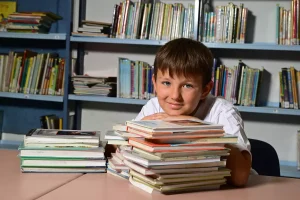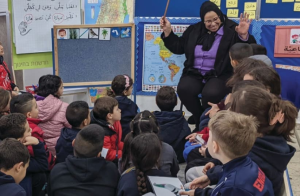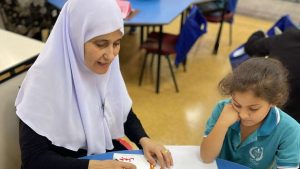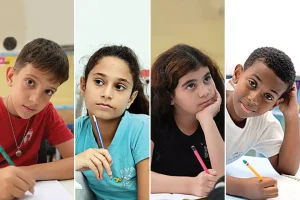One million children returned to school this week, but for sixth graders, this is more than a hope for routine – it’s a fight for a normal childhood. A generation that entered kindergarten during the pandemic, started elementary school under lockdowns, and studied in the shadow of war is asking for one quiet year – no sirens, no interruptions. Three principals share their experience of keeping their schools stable amid chaos and their simple dream: that children can just be children.
Mako
Published: 04.09.25, 08:51 | Updated: 04.09.25, 12:16

This week, the new school year began and over a million children returned to classrooms across the country, hoping that this year will finally bring routine and growth. For sixth graders, this simple wish – to complete elementary school without interruptions, war, or anxiety – is shared by teachers, principals, and all educational staff, who long for a year in which learning can continue without disruption.
These children spent their entire elementary years in turmoil: kindergarten began in September 2019, only for COVID-19 to shut schools by March. First grade started under restrictions, with repeated lockdowns and remote learning. By fourth grade, the “Iron Swords” war broke out, and fifth grade ended amid the war with Iran. Now, entering sixth grade, they hope for a year of normalcy, with lessons, field trips, and everyday experiences.
These challenges affected not only students – teachers and principals also had to find ways to stay effective in the classroom. The Israel Center for Educational Innovation (ICEI) guided schools through these crises, adapting its methods and providing close support to staff, helping schools continue functioning even under extreme pressure. For 16 years, ICEI has worked in schools in socially disadvantaged communities, in partnership with the Ministry of Education, the Ministry for Social Equality, and local authorities. Today, it supports more than 60 Jewish and Arab schools and over 30,000 students annually.
The sixth graders beginning school today belong to a generation shaped by uncertainty – but also remarkable resilience. After six years of upheaval, their principals hope they can finally enjoy a year where they simply get to be children.
Three principals working with ICEI spoke with Mako about how they’ve supported students and staff through these challenges – and their dream of a school year filled with steady learning and growth.
Principals Speak
Michal Baruven: “Focusing on education kept me sane.”
Alon Yizre’el School, Afula | 540 students, 22 classes

Michal Baruven has been principal of Alon Yizre’el School for nine years. During this period, the school has grown from 240 students to 540 and Baruven even won the Rothschild Education Prize. When the war began on October 7, 2023, she faced a complex personal situation: all three of her children were serving in the army – one in mandatory service, one in reserves, and a daughter serving with evacuees in the north.
“After October 7th, I felt like I too was drafted, but to my school,” she says. “There were long days when I didn’t know what was happening with my sons, who were fighting in two different areas in Gaza. I decided to focus on the school – to be ‘on duty’ for my students and staff. That’s what kept me sane.”
COVID-19, she says, prepared them to some extent: “The pandemic caught us off guard, but by the time the war started, we already knew how to quickly build routines and maintain close ties with students remotely and in person.” Still, fifth and sixth graders had unique challenges: “They entered first grade without proper reading and writing readiness. Only last year did I feel we truly closed those gaps.”
As principal, Baruven saw her role first and foremost as supporting her staff. With her deputy principal, Neta Shani, school psychologist, and counselor, she created a support team for teachers. “I realized that if the staff had a safe place to share, they could in turn help build resilience among students and parents.”
The support of the Israel Center for Educational Innovation (ICEI) during this time was crucial. ICEI has been supporting the school through the Meisharim initiative, a Joint Venture between the Ministry of Education and Yad Hanadiv. “Because ICEI had embedded its teaching methods in the school, they were ready to be implemented immediately during remote learning. My ICEI Principal Mentor provided daily guidance, while ICEI’s Director of Parent & Community Engagement applied these tools directly in the school.”
The community rallied. “The most moving thing was seeing how every gap was filled – every child got support. Some had fathers and brothers fighting in Gaza, and some lost relatives at the Nova festival massacre. We also absorbed six families of evacuees from the north and south.”
During the war with Iran, rockets impacted near Afula, and countless sirens sounded. “By the second day, we returned to remote learning. Teachers held afternoon and evening Zoom meetings when sirens kept children up at night.”Her wish for the new year: “That we will see the war end and the hostages return. The children deserve a safe, routine year – where they can study, travel, play, and just be kids.”
Shai Dahan: “A student told me, ‘I thought school was every other year.’”
Efrati Religious Public School, Bnei Ayish | 170 students, 6 classes

Shai Dahan has been the principal of the Efrati School for five years. In the past two years, he has served over 200 days of reserve duty, while managing his school. He makes a point of maintaining personal contact with students. “Every month, I hold a birthday gathering for kids,” he says. “At one, a child told me: ‘I thought we study one year on, one year off.’ That sums it up – the breaks and chaos have become almost normal for them.”
Despite the hardships, he sees unexpected strengths: “These years nurtured creativity and out-of-the-box thinking. But academically, there are big gaps. Months went by when children hardly left their homes. Some face anxiety, some have parents called up for military service. Add to that sirens and canceled field trips – everything is at the breaking point. There’s also a deep need to help them rebuild social skills.”
How does a school function when the principal is in the reserves? “When everyone knows their role, things continue running. I learned to trust my deputy principal and coordinators. In war, I saw how much responsibility they carried. It built true leadership.”
ICEI’s methods and tools, already embedded in the school, were crucial. “They helped us build clear routines – for both students and teachers. This makes management easier during normal periods – but in war, it was critical. With routines in place, students know what’s expected, and teachers know how to effectively teach remotely. That structure brought a sense of calm that allowed the school to keep running even when I wasn’t physically present.”
“You never know if rockets will fall tomorrow morning and children won’t be able to come to school. We’ve learned to develop different management skills and keep things running even amid uncertainty. Just as during COVID-19 we adapted to a new routine, in wartime we’ve learned how to care for the children – how to make remote lessons engaging and how to pay attention to every student.”
And what happens when you return from reserve duty? “The younger children mostly just miss me – they’re happy when I come back. They send messages, ask where I am. In Gaza, I couldn’t always respond, so parents would call and check. That personal connection kept both them and me going.”
His wish for the new year: “I wish for stability and a sense of normalcy. May we build on the skills we’ve recently discovered while strengthening social abilities. May we also inspire curiosity and a love of learning in the children. Above all, may we live here in peace.”
Iman Amer Khalala: “In third grade, some children couldn’t read or write.”
Jabour Jabour School, Shfaram | 430 students, 17 classes

Iman Amer Khalala became the principal of the Jabour Jabour School in September 2019. Six months later, COVID hit. Since then, she hasn’t had a single quiet year. Jabour Jabour, established in 1962, was once a symbol of education in Shfaram, but in recent years declined and even faced closure. When she took over, it had just 180 students; today, thanks to her leadership, it has 430 – Muslim, Christian, Druze, and Bedouin.
“My first assessment portrayed a difficult picture – even in third grade, children couldn’t read or write Arabic,” she recalls. “Today, we’ve completely changed that. I don’t give up on any child – everyone can succeed if given the right tools.”
COVID worsened the situation: many students lacked computers or internet access, further widening disparities. With the municipality’s help, computers and tablets were distributed, enabling remote learning.
Then came the war. “Anxiety seeped into the school corridors,” she says. “Students, parents, and teachers were emotionally unavailable for learning, on top of years of instability, renovations that required the school to relocate, and now, war.”
The toll was also deeply personal: two of her childhood friends from Tamra – both teachers – were killed by an Iranian missile. “After losing them, it wasn’t easy to return to work, but I had to. If the principal collapses, the whole system collapses. Everyone looks to me, so I must remain strong.”
ICEI has been supporting Jabour Jabour School since Khalala’s second year as principal. “In my second year, at the height of the pandemic, ICEI started working with the school. From that moment, I knew I wasn’t alone,” she says. “My ICEI Principal Mentor gave me professional tools, and ICEI’s Director of Parent & Community Engagement applied ICEI’s practices to strengthen ties with parents. ICEI’s guidance was what enabled me to keep going through the toughest years.”
She also mobilized the municipal psychologist and school counselor to create a support system: workshops for parents, stress relief for teachers, and art and music classes for children. “That was the only way to continue teaching and fostering students’ progress.”
Her wish for the new year: “A year of peace and love, stability and calm. Students deserve peace of mind – that’s the foundation for everything else.”





